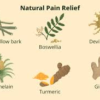Managing Sinusitis with Ayurvedic Herbs
Managing Sinusitis with Ayurvedic Herbs an inflammation of the sinuses, is a common condition that affects millions worldwide. It can result from infections, allergies, or other factors, leading to symptoms like nasal congestion, facial pain, and headaches. While conventional treatments are often effective, many people seek alternative approaches for relief, including Ayurveda. This ancient Indian system of medicine offers a holistic approach, utilizing herbs and natural remedies to alleviate symptoms and promote overall well-being. In this blog, we’ll explore how Ayurvedic herbs can help manage sinusitis and support sinus health.
Understanding Sinusitis

Sinusitis occurs when the sinuses—the air-filled spaces in the forehead, cheeks, and nose—become inflamed. This inflammation can lead to blocked nasal passages, resulting in the buildup of mucus. The condition can be acute, lasting a few weeks, or chronic, persisting for months or even years.
Symptoms of sinusitis include:
- Nasal congestion
- Thick nasal discharge
- Facial pain or pressure
- Headache
- Cough
- Reduced sense of smell
- Fatigue
Sinusitis can be triggered by various factors, including:
- Viral or bacterial infections
- Allergies
- Nasal polyps
- Deviated septum
- Environmental irritants
Ayurvedic Perspective on Sinusitis

Ayurveda, a traditional system of medicine from India, emphasizes balance among the body’s three doshas: Vata, Pitta, and Kapha. Sinusitis is primarily associated with an imbalance in the Kapha dosha, which governs mucus production and fluid balance.
According to Ayurveda, sinusitis is linked to an excess of Kapha and Ama (toxic buildup) in the body. The Kapha dosha can become aggravated due to factors like poor diet, lack of exercise, or exposure to environmental toxins. This imbalance leads to increased mucus production and congestion, which manifests as sinusitis.
Ayurvedic Herbs for Sinusitis
Ayurvedic herbs can be used to balance the Kapha dosha, reduce inflammation, and support sinus health. Here are some effective herbs and formulations:
1. Turmeric (Curcuma longa)
Turmeric is renowned for its anti-inflammatory and antimicrobial properties. Curcumin, the active compound in turmeric, helps reduce inflammation in the sinuses and supports the immune system.
How to Use:
- Turmeric Tea: Add a teaspoon of turmeric powder to a cup of warm water or milk. Drink this tea once or twice daily.
- Turmeric Paste: Mix turmeric powder with a little water to form a paste. Apply this paste to the affected areas on the face to help reduce sinus pain.
2. Ginger (Zingiber officinale)
Ginger is another powerful anti-inflammatory herb that can help alleviate sinus congestion and pain. It also supports digestion and boosts overall immunity.
How to Use:
- Ginger Tea: Boil fresh ginger slices in water for 10 minutes. Strain and drink the tea twice daily.
- Ginger and Honey: Mix a teaspoon of ginger juice with a teaspoon of honey. Consume this mixture once or twice daily.
3. Eucalyptus (Eucalyptus globulus)
Eucalyptus oil has decongestant properties and can help clear nasal passages and reduce sinus pressure. It is often used in steam inhalation to provide relief.
How to Use:
- Steam Inhalation: Add a few drops of eucalyptus oil to a bowl of hot water. Inhale the steam by covering your head with a towel and breathing deeply for 10 minutes.
- Eucalyptus Oil: Dilute eucalyptus oil with a carrier oil (such as coconut oil) and apply it to the chest and throat.
4. Holy Basil (Ocimum sanctum)
Holy basil, or Tulsi, is revered in Ayurveda for its immune-boosting and anti-inflammatory properties. It helps in clearing mucus and reducing sinus inflammation.
How to Use:
- Tulsi Tea: Steep a handful of Tulsi leaves in hot water for 5-10 minutes. Drink this tea once or twice daily.
- Tulsi Extract: Tulsi extracts or capsules can be taken according to the manufacturer’s instructions or as advised by an Ayurvedic practitioner.
5. Peppermint (Mentha piperita)
Peppermint has menthol, which acts as a natural decongestant. It helps to soothe the nasal passages and relieve sinus pressure.
How to Use:
- Peppermint Tea: Brew peppermint leaves in hot water and drink the tea to ease sinus congestion.
- Peppermint Oil: Add a few drops of peppermint oil to a diffuser or steam inhalation. Alternatively, dilute with a carrier oil and apply to the temples.
6. Cinnamon (Cinnamomum verum)
Cinnamon has anti-inflammatory and antimicrobial properties. It can help reduce sinus inflammation and fight infections.
How to Use:
- Cinnamon Tea: Boil a cinnamon stick in water and drink the tea once or twice daily.
- Cinnamon and Honey: Mix cinnamon powder with honey and consume this mixture to help alleviate sinus discomfort.
Lifestyle and Dietary Recommendations
In addition to herbal remedies, Ayurveda emphasizes the importance of lifestyle and dietary changes to manage sinusitis effectively. Here are some tips:
1. Dietary Adjustments
- Avoid Kapha-Aggravating Foods: Reduce intake of heavy, oily, and dairy-rich foods that can increase Kapha and mucus production. Opt for light, easily digestible foods.
- Incorporate Spices: Include warming spices like black pepper, ginger, and turmeric in your diet to help balance Kapha and improve digestion.
- Stay Hydrated: Drink plenty of warm fluids to help thin mucus and keep the sinuses hydrated.
2. Nasya Therapy
Nasya is an Ayurvedic therapy involving the application of herbal oils or extracts to the nasal passages. It helps in clearing excess mucus and reducing inflammation.
How to Use:
- Nasya Oil: Warm a few drops of Nasya oil (such as Anu Taila) and apply it to the nasal passages. Follow the instructions provided by your Ayurvedic practitioner.
3. Regular Exercise
Engaging in regular physical activity helps in maintaining overall health and balancing the doshas. Exercise promotes proper circulation and helps in reducing sinus congestion.
4. Proper Sleep
Adequate rest is essential for immune function and overall health. Ensure you get quality sleep to support your body’s healing processes.
5. Avoid Allergens and Irritants
Identify and avoid potential allergens and environmental irritants that may trigger sinusitis symptoms. This includes dust, pollen, and smoke.
Conclusion
Managing sinusitis with Ayurvedic herbs offers a natural and holistic approach to alleviating symptoms and promoting sinus health. By incorporating herbs like turmeric, ginger, eucalyptus, holy basil, peppermint, and cinnamon, along with lifestyle and dietary adjustments, you can support your body’s natural healing processes and restore balance to the Kapha dosha.
However, it’s important to consult with a qualified Ayurvedic practitioner or healthcare provider before starting any new treatment regimen, especially if you have underlying health conditions or are taking other medications. Managing Sinusitis with Ayurvedic Herbs Ayurveda’s personalized approach ensures that treatments are tailored to your individual needs, providing a comprehensive path to wellness and relief from sinusitis.
Embracing Ayurvedic principles and herbs can be a valuable addition to your wellness toolkit, helping you breathe easier and live more comfortably.








Leave a reply